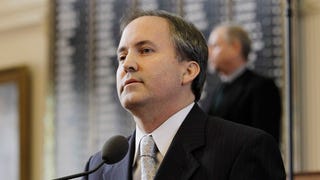My Name Is Only Real Enough to Work at Facebook, Not to Use on the Site
I always knew this day would come. The day that Facebook decided my name was not real enough and summarily cut me off from my friends, family and peers and left me with the stark choice between using my legal name or using a name people would know me by. With spectacular timing, it happened while I was at trans pride and on the day the Supreme Court made same sex marriage legal in the US.
This is a story that’s been told many times before. It is a story I’ve seen repeated time and time again as my friends have disappeared off the site, often never to return. This time there’s a twist: I used to work there. In fact, I’m the trans woman who initiated the custom gender feature. And the name I go by on Facebook? That’s the name that was on my work badge.
Facebook likes to think of names as a one-to-one mapping. You have one name, and that name is how people refer to you at all times. It’s a very WASP notion of how names work, and the reality is far more complex. Names are a tool for description, a shorthand for quickly communicating the idea of a person or thing. They change based on context. Each person has many names, because each person has many contexts and social groups. Like the government, Facebook tries to warp all of these contexts into one identifier. And like the government, it demands the final say in what you are called.
As a technology, Facebook isn’t neutral. It’s actually changing the way we interact with names. Before Facebook how many of your friends’ surnames did you actually know?
I chose my Facebook name six years ago, as I began my transition. Every person I’ve met since then has generally known me by that name, and in part this is precisely because I use it on Facebook. I so strongly identify with and am identified by that name that when I took a job at Facebook I put it on my badge.
As a company, Facebook tells itself a story about what names are and how they are significant. It’s deeply embedded within their understanding of why the site was successful. On my very first day in orientation, a VP of the company told us the story of Facebook. It is a story of how authenticity triumphed — how people using their names instead of handles encouraged them to add people they were genuinely friends with and to talk about their daily lives. He told us how when you joined Myspace you’d be told you were now friends with the founder, even though this was not true. It set the tone that “friend” on the site didn’t mean the same thing as a real-life friend.
I think they’re right. Creating a social network where people used the names that they were already recognised by has made it more accessible and popular than any other social network in the world. Cynics will tell you that using your “real name” is so they can sell your details to advertisers. That’s not the case. Why would they hand over the ability to market to you? The real story is more subtle. If you don’t use a name that other people recognise, you won’t interact so much. If Facebook develops a culture of people not being immediately recognisable, it drives down engagement. That costs ad impressions.
So Facebook wants you to be your authentic self because they believe that authenticity is what makes the site appealing. No fake usernames or second profiles or profiles for things that aren’t people means more eyeballs on the site.
The problem comes at the interface where this notion collides with reality. Names aren’t that simple and the reasons people use names are also not that simple. It’s been covered a thousand times before. We use names that don’t match our ID on Facebook for safety, or because we’re trans, or because we’re just straight up not known by our legal names.
Having chosen its policy, Facebook has to enforce it. And because its policy attempts to hammer the reality of names into a constrained model they end up having to make a trade-off in the edge cases. Some people are not allowed to use their names so that everyone else’s can be enforced.
Worse still, they allow people to report each other for using “fake” names. People know this, and they use it as a mechanism to kick each other off the site. If you’re a marginalised person, such as a trans person, you may be left with no way to get back on. Facebook have handed an enormous hammer to those who would like to silence us, and time after time I see that hammer coming down on trans women who have just stepped out of line by suggesting that perhaps we’re being mistreated. In fact, it happened to me shortly after commenting on a Facebooker’s post that Facebook needs to step up on this issue.
Facebook is a vital tool for community, especially for those of us who are marginalised. It withholds our access to friends and support in order to enforce their policy, and in so doing we are faced with a stark choice between a name we do not identify with and do not want to use, or being disconnected. If we make the choice to stay we find ourselves increasingly recognised by other people by that forced name.
By forcing us to change our names on the site, Facebook changes the names we are known by in real life — whether we like it or not.
I really cannot understate the impact being kicked off the site can have. Facebook is my main way of communicating with much of my social circle. It’s how I’ve found housing and housemates. It’s where I’ve found job leads, received support in hard times, and helped other people through theirs. My legal name is long since changed and perhaps that’s enough to tip the balance towards using it, but I have not once seen a trans person return to the site under their old name no matter the costs of leaving the site permanently.
It’s an insult that Facebook is sponsoring Pride in SF, marching and flying the rainbow flag and helping everyone change their profile picture, when they cannot fix this simple thing.
Facebook needs to do better than this. Technology is not neutral, and a technology that a billion people use to communicate has the power to warp and change reality around itself. Adding custom gender was a small change, yet it hit the front page of CNN, angered Fox News and got its own segment on The Daily Show. It encouraged other large sites such as Google Plus and OKCupid to handle nonbinary gender too. It exposed the world to the notion that gender might not be a binary. That’s profound. It’s time for Facebook to step up and do the same thing for names.
We’re protesting this policy by deactivating our accounts for a day. #LogOffForPride and make engagement drop instead of rise.
This article originally appeared on Medium, and was republished here with the permission of the author.














No comments:
Post a Comment
Please leave a comment-- or suggestions, particularly of topics and places you'd like to see covered